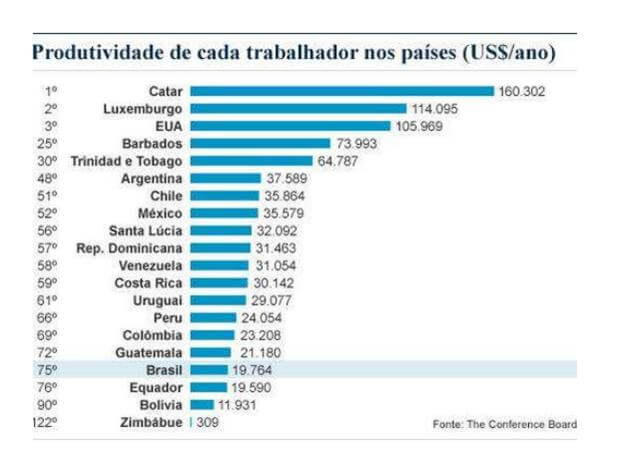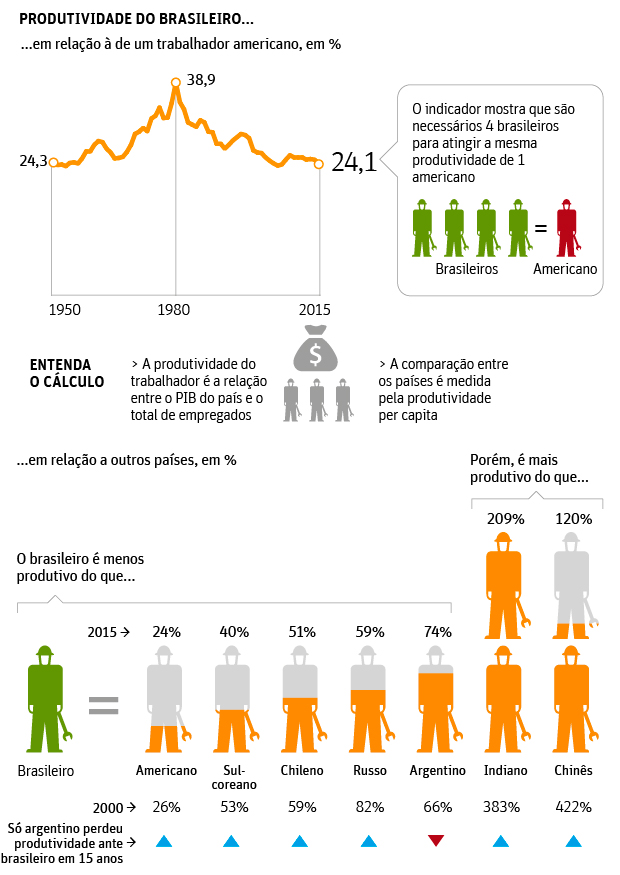You may have read or heard about the low productivity of professionals in Brazil. It is common subjects pointing out the difference in productivity between Brazilians and Americans and studies that show indexes and productive growth in different countries .
This definition of productivity is calculated based on how much each professional contributes to GDP (Gross Domestic Product) in each country. This does not surprise us that Brazil is far from the countries with the highest productivity, being 75th in the world .
Check out the graph below the placement of each country in the productivity of each worker:

Worse than this position, it is the fact that Brazil has not evolved in relation to the productivity of its professionals. For Americans, the distance is increasing and closer to 1950 levels, as this Conference Board , an American organization that analyzes data from thousands of companies in over 60 countries.
The chart also shows that Brazilian workers are even more productive than Chinese and Indians.

According to experts, the low productivity rates in Brazil are derived from three factors, especially:
- Low educational level and lack of technical qualification of Brazilian professionals
- Low level of resources in relation to equipment and machinery and support structures
- Inefficiency of the economy and infrastructure bottlenecks
- Lack of interest to professionals to seek better results
The low level of education in Brazil is clearly one of the limiters for improving wealth production in the country. Brazilians study on average 7 years, while in the US there are an average of 12 years of study, including higher education, as well as the difference in the quality of education. Not by chance that South Korea is at the top of the list of the most productive countries, as it is one of the nations that invests most in education in the world.
Similarly, investments in infrastructure, both by the private and government market, is still very low. Most companies do not invest in machinery and equipment and do not value the creation of a good work environment for their employees, which directly and negatively influences the productivity of the team and the company in general.
The lack of interest of professionals in seeking better results is also a determining factor for Brazil to be with low levels of productivity, as Brazilian professionals are accommodated and without willingness to improve and increase their results in their activities.
Analyzing the four factors separately, we can see that the first two are directly linked to business management practices and that it is possible to circumvent this low productivity with a posture focused on the qualification of employees and investing investment in machines/equipment and work environment.
Therefore, it is up to companies to revert the medium low productivity of professionals in Brazil, through training and qualification practices of employees and investment in equipment and work environment favorable to production and high performance of professionals.
But professionals need to show interest in increasing productivity and performance in the face of proposed activities. Only in this way, resulting from a union of companies and professionals that it is possible to improve this Brazilian placement.
Now, bringing this analysis to the practice of strategy and management in companies, it is clear that it is possible to achieve levels of productivity from countries such as the United States and South Korea. For this it is essential, first, attract professionals with good level of training and invest in permanent team qualification.
In another comparison, professionals receive an average of 120 hours of training per year, while in Brazil the average is just 30 hours .
In addition, it is essential to use management practices to increase team productivity , some important practices are:
- Definition of goals by team and collaborators
- Valorization of collective work and internal communication
- Explore IT resources, such as modern systems and equipment
- Task Management and Results Monitoring
- Benefits and bonuses for employees based on results presented
Each of these measures aims to extract the capacity of professionals as much as possible and allow them to perform their tasks in the best way.
It is also important to emphasize that each company and team has peculiar characteristics and it is up to managers to identify the most relevant points and that they should receive more attention to the investment in the company's human capital.
In addition to investment in human capital, it is also necessary to invest in infrastructure equipment, in which case priorities must be in accordance with the profile of each company, for example industries, need modern machines, quality support equipment and well -defined processes.
Office environments Investment goes through comfortable facilities and quality technology resources, such as high performance equipment, modern management tools and good quality internet.
Bringing this theme to the safer and more productive use of the internet in companies, which is one of the main objectives of the contents of our blog and Lumiun Tecnologia as a solution for this purpose, it is necessary for managers to understand how good network function can contribute to the execution of tasks.
Even the importance of managing the internet so that the network is used productively, avoiding waste of time and resources, prioritizing services and resources related to the company's activities. To learn more, contact our service .
In conclusion, the most important thing is that companies and managers assume the responsibility of continually seeking to enhance their productivity and that it is essential to invest in human capital and infrastructure.
Even this investment strategy is common in companies that grow and develop in the country, as in an increasingly competitive market, the differential often becomes the efficiency of the company, in relation to competitors.
Did you like this content? Share with us your experience or vision on this topic, how you realize that your company faces this issue of productivity of professionals and what can be done to reach the countries that are at the top of the most productive list in the world!










7 Comments
Comments closed